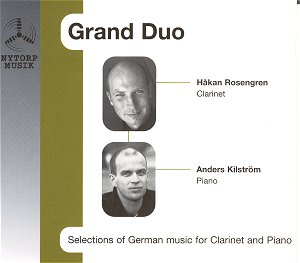|
|
Search MusicWeb Here |
|
 |
||
|
Founder:
Len Mullenger (1942-2025) Editor
in Chief:John Quinn
|
|
|
Search MusicWeb Here |
|
 |
||
|
Founder:
Len Mullenger (1942-2025) Editor
in Chief:John Quinn
|
 |
Carl Maria von WEBER (1786-1826) Grand
Duo Concertante Op. 48 (1816) |
|
|
|
I knew next to nothing about this Swedish label and, indeed the artists recorded here (although Rosengren has appeared on Sony Classical), until listening to this disc. However, if this release is typical of the quality produced by either then I would like to hear much more. The subtitle of "selections of German music for clarinet and piano" didn't exactly have me on the edge of my seat in anticipation but, in this case, I probably should have been. Not only are the performances and recording superb, the music chosen is suitably varied yet thematically consistent in offering an excellent and appropriate overview of the development of the form in the "German tradition", while reminding us of, say, Hindemith's debt to Weber, not only but certainly not least in his celebrated Symphonic Metamorphosis. It also celebrates, in Hindemith and Brahms, two composers who have often been, unfairly as far as this listener is concerned, on the receiving end of what is known as a "bad press". Some of the creators of the greatest musical turning points in the early 20th century owe a great debt to Brahms (Charles Ives and Carl Nielsen, both truly essential and charismatic figures, would have been nowhere originally without him, and the same goes for the composer who kick-started the British revival, Charles Villiers Stanford). As for Hindemith, I would contend that he is, in many ways, just as significant as the ubiquitous Stravinsky (Mathis der Maler, Ludus Tonalis, Nobilissima Visione etc., masterpieces all). |
|
Return to Index |